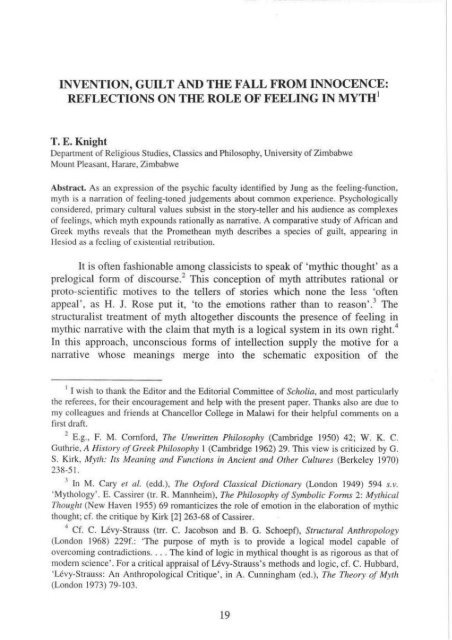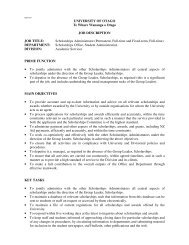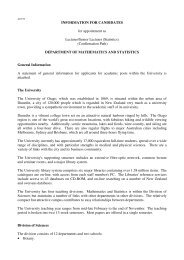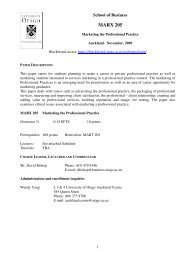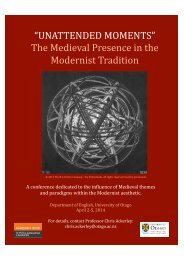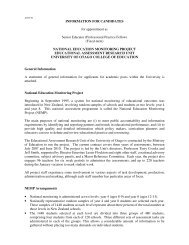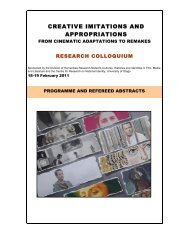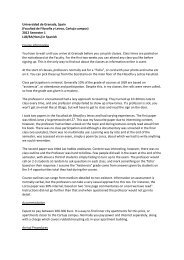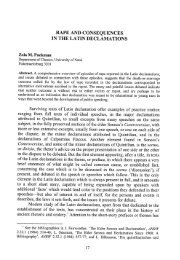scholia - University of Otago
scholia - University of Otago
scholia - University of Otago
Create successful ePaper yourself
Turn your PDF publications into a flip-book with our unique Google optimized e-Paper software.
INVENTION, GUILT AND THE FALL FROM INNOCENCE:<br />
REFLECTIONS ON THE ROLE OF FEELING IN MYTH 1<br />
T. E. Knight<br />
Department <strong>of</strong> Religious Studies, Classics and Philosophy, <strong>University</strong> <strong>of</strong> Zimbabwe<br />
Mount Pleasant, Harare, Zimbabwe<br />
Abstract. As an expression <strong>of</strong> the psychic faculty identified by Jung as the feeling-function,<br />
myth is a narration <strong>of</strong> feeling-toned judgements about common experience. Psychologically<br />
considered, primary cultural values subsist in the story-teller and his audience as complexes<br />
<strong>of</strong> feelings, which myth expounds rationally as narrative. A comparative study <strong>of</strong> African and<br />
Greek myths reveals that the Promethean myth describes a species <strong>of</strong> guilt, appearing in<br />
llesiod as a feeling <strong>of</strong> exi:.tc;ntial retribution.<br />
It is <strong>of</strong>ten fashionable among classicists to speak <strong>of</strong> 'mythic thought' as a<br />
prelogical form <strong>of</strong> discourse. 2 This conception <strong>of</strong> myth attributes rational or<br />
proto-scientific motives to the tellers <strong>of</strong> stories which none the less '<strong>of</strong>ten<br />
appeal', as H. J. Rose put it, 'to the emotions rather than to reason'. 3 The<br />
structuralist treatment <strong>of</strong> myth altogether discounts the presence <strong>of</strong> feeling in<br />
mythic narrative with the claim that myth is a logical system in its own right. 4<br />
In this approach, unconscious forms <strong>of</strong> intellection supply the motive for a<br />
narrati ve whose meanings merge into the schematic exposition <strong>of</strong> the<br />
1 I wish to thank the Editor and the Editorial Committee <strong>of</strong> Scholia, and most particularly<br />
the referees, for their encouragement and help with the present paper. Thanks also are due to<br />
my colleagues and friends at Chancellor College in Malawi for their helpful comments on a<br />
first draft.<br />
2 E.g., F. M. Cornford, The Unwritten Philosophy (Cambridge 1950) 42; W. K. C.<br />
Guthrie, A History <strong>of</strong> Greek Philosophy I (Cambridge 1962) 29. This view is criticized by G.<br />
S. Kirk, Myth: Its Meaning and Functions in Ancient and Other Cultures (Berkeley 1970)<br />
238-5 1.<br />
-' In M. Cary et a/. (edd.), The Oxford Classical Dictionary (London 1949) 594 s.v.<br />
'Mythology'. E. Cassirer (tr. R. Mannheim), The Philosophy <strong>of</strong> Symbolic Fonns 2: Mythical<br />
111ougltt (New Haven 1955) 69 romanticizes the role <strong>of</strong> emotion in the elaboration <strong>of</strong> mythic<br />
thought; cf. the critique by Kirk [2] 263-68 <strong>of</strong> Cassirer.<br />
4 Cf. C. Levy-Strauss (trr. C. Jacobson and B. G. Schoepf), Structural Anthropology<br />
(London 1968) 229f.: 'The purpose <strong>of</strong> myth is to provide a logical model capable <strong>of</strong><br />
overcoming contradictions .... The kind <strong>of</strong> logic in mythical thought is as rigorous as that <strong>of</strong><br />
modern science'. For a critical appraisal <strong>of</strong> Levy-Strauss's methods and logic, cf. C. Hubbard,<br />
'Levy-Strauss: An Anthropological Critique', in A . Cunningham (ed.), The Theory <strong>of</strong> Myth<br />
(London 1973) 79-103.<br />
l9


